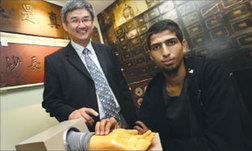Pakistani student takes up studies in Chinese medicine
Updated: 2012-10-23 06:53
By Fan Feifei(HK Edition)
|
|||||||
|
Chinese medicine doctor Kevin Yue (left) teaches Khan Taimoor, a Pakistani, at a class on pulse in Hong Kong Baptist University on Monday. Khan has become the first Pakistani undergraduate student studying Chinese medicine in the city. Edmond Tang / China Daily |
Twenty-one-year-old Khan Taimoor began his study of traditional Chinese medicine at Hong Kong Baptist University this September, the first ethnic Pakistani ever admitted to the School of Chinese Medicine at Baptist University. But Khan, grew up in Hong Kong, is educated here and speaks Cantonese and English fluently.
"During my childhood, I saw the chronic disease of my friend cured by Chinese medicine, so it generated my interest in the field," he said.
He said that his mother has suffered from nasal allergies for many years. "I hope to heal her affliction through my study of Chinese medicine," Khan said.
Khan will spend five years getting a Bachelor's Degree in Chinese medicine at the university.
However, he also expressed some concern that his Pakistani origins may be a detriment to his future practice - worrying that local people may not give him much credence as a practitioner of Chinese Medicine.
He admits, he needs to learn more about Chinese culture, classical Chinese and ancient grammar to research traditional Chinese medical literature, adding that he's confident he can meet those challenges.
He said he finds Chinese medicine amazing, noting that the biggest difference between traditional Chinese medicine and Western medicine is that Chinese medicine emphasizes the "whole" and cures the disease "fundamentally".
He said hoped to extend Chinese medicine into the South Asian community when he finishes his studies.
Kevin Yue, associate director of the School of Chinese Medicine, said Khan's admission was a good deed to help promote traditional Chinese medicine, because Hong Kong is an international city and of strategic importance.
Fermi Wong, executive director of Hong Kong Unison, a non-governmental organization serving ethnic minority in the city, said she is very happy to learn Khan's enrollment.
Wong said there have been several people from Hong Kong ethnic minorities who went to the mainland to study western medicine in the past few years, but less than one percent of ethnic minorities are able to go to local colleges to for further studies.
"I hope the student will do his best to extend traditional Chinese medicine," added Wong.
Wong described the decision to admit Khan symbolized the position of Chief Executive Leung Chun-ying - "seven million Hong Kong residents are a family".
"This case sets a good example and it is a good beginning. We also expect there could be more and more ethnic minority students receiving university education in the future," said Wong.
fanfeifei@chinadailyhk.com
(HK Edition 10/23/2012 page1)
